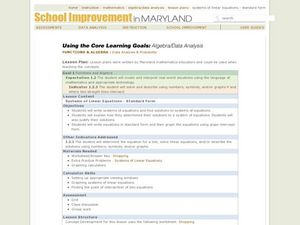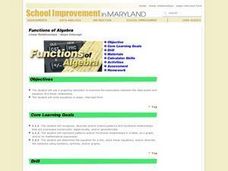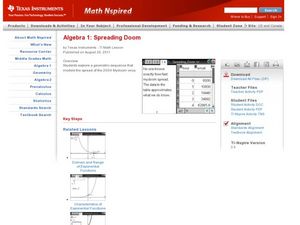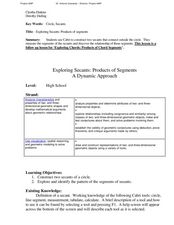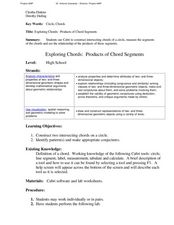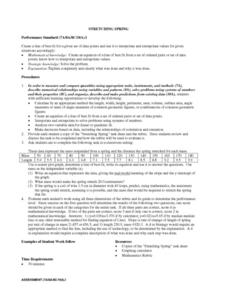Curated OER
Grade 5: Testing for Tessellations
Fifth graders use formal geometric language to describe polygons (and other shapes) that will tessellate the plane and those that will not. Students make generalizations about the characteristics of a polygon (or other shape) that will...
Curated OER
Finding Area of Similar Figures
Students explore the concept of finding area of similar figures. In this finding area of similar figures lesson, students use pattern blocks to construct similar figures. Students trace their construction and find the area. Students...
Curated OER
Volume and Surface Area: Which Is More?
Learners explore the volume and surface area of three dimensional figures. Through the use of video, students discover three dimensional shapes, their uses in real-life applications, and methods used to calculate their volume and surface...
Curated OER
Literacy Activity: Mouse Shapes
Students listen to the book Mouse Shapes and identify the shapes in the book as it is being read. In this shapes lesson, students identify the shapes in the book, and then play with cut out shapes that they can hold in their hands.
Curated OER
Functions & Algebra
Learners examine linear equations. For this functions and algebra lesson, students write equations in the slope-intercept form. They enter data in a graphing calculator, examine tables, and write linear equations to match the data.
Curated OER
What Shape am I?
Students analyze characteristics of geometric shapes. They find shapes in their environment, and communicate why it is like the shape of their choice and not like another shape.
Curated OER
A Polynomial Quilt
Tenth graders create polynomial quilts. In this polynomials lesson, 10th graders use concrete models, such as construction paper, to create various shapes described. Students use the FOIL method to multiply terms and to get a square...
Curated OER
Geometry and Tony Smith Sculpture
Young scholars respond to Tony Smith's sculpture as art and brainstorm about math concepts inherent in his work. They create a sculpture with polyhedra nets, calculate the cost of covering sculpture in gold, and write an exhibit label...
Curated OER
Linear Relationship
Students use a graphing calculator to examine the association between the data points and equation of a linear relationship. They write equations in slope- intercept form. Answer key included.
Curated OER
Spreading Doom
Students explore the pattern created by a sequence or series. In this geometry lesson, students relate the spread of a virus to the growth of exponential functions. They collect data as they analyze the sequence created by the growth.
Curated OER
A World of Symmetry
Middle schoolers identify lines of symmetry. In this symmetry lesson, students create objects and identify their lines of symmetry. They answer questions about lines of symmetry. Middle schoolers cut shapes out of...
Curated OER
Pyramids and Prisms: Guler's Formula
Sixth graders detect and categorize the attributes of geometric shapes to solve problems. In this geometry lesson, 6th graders construct a variety of polyhedra. Students recognize the relationships between two dimensional and three...
Curated OER
Castles and Cornerstones
Students become familiar with the style of architecture of medieval times. In this architecture lesson, students design a model of a medieval castle including its cornerstone. Students understand scale in their representation.
Curated OER
Sort it Out
Students identify and sort a variety of two- and three-dimensional objects and compare and contrast their attributes. They identify shapes, locate shapes on the faces of solids, sort real objects and explain the sorting rule, and...
Curated OER
Lines of Symmetry
Fifth graders explore the concept of symmetry using lines drawn through different shapes. The worksheet that is included in the lesson should be used to chart the lines of symmetry for the different shapes drawn.
Curated OER
Turn Symmetry
Fourth graders observe geometric patterns to determine if they show rotational or point symmetry. They participate in the a demonstration instructional activity with a triangle. They create their own designs that show rotational or point...
Curated OER
Geometry Scavenger Hunt
Pupils use the digital camera, identify geometric shapes (in nature as well as man-made), and gain a better understanding of geometric vocabulary. They search for and recognize geometric shapes in unusual settings
Curated OER
Symmetry: Theory, Reality and Art!
Students explore the concept of geometric symmetry. In this geometric symmetry lesson, students walk around their school and take pictures of objects that demonstrate symmetry. Students use Microsoft Paint to draw the lines of symmetry...
Curated OER
Circle, Secants
Young scholars identify the secant segment of a circle. In this geometry lesson, students investigate secant lines formed outside the circle. They use Cabri software to create drawings and explore circles and secants.
Curated OER
Exploring Secants: Products of Segments
Pupils explore secants and circles. In this geometry lesson, students identify the properties of two and three dimensional shapes. They create arguments to prove the theorems are true.
Curated OER
Exploring Chords: Products of Chord Segments
Students identify the properties of chords. In this geometry lesson plan, students multiply chord segments to find the solution to their problem. They construct two chords that cross on a circles.
Curated OER
Product of Chord Segments
Young scholars creating chords intersection using circles. In this geometry lesson, students create visuals of chords ad their properties using Cabri technology. They measure the chords and explore the relationship among chords.
Curated OER
STRETCHING SPRING
Learners calculate the length, width, height, perimeter, area, volume, surface area, angle measures or sums of angle measures of common geometric figures. They create an equation of a line of best fit from a set of ordered pairs or...
Curated OER
Exploring the Properties of Rectangular Prisms.
Students define properties of rectangular prisms. In this geometry lesson, students identify the relationship between two and three dimensional objects. They use Cabri technology to graph their figures.




